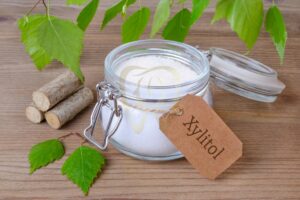Dental health is a crucial aspect of overall well-being, and maintaining strong and healthy teeth is essential for a confident smile and effective chewing. In recent years, xylitol has emerged as a popular topic of discussion within the dental community due to its potential benefits for oral health. This article aims to provide a comprehensive overview of xylitol’s benefits for teeth, shedding light on its effectiveness and practical applications.
In the pursuit of maintaining optimal dental health, individuals often explore various avenues to enhance their oral care routines. Xylitol, a natural sugar substitute derived from plants, has gained significant attention for its potential benefits in promoting dental health. Research suggests that incorporating xylitol into your oral care regimen could contribute to preventing dental decay and improving overall oral hygiene.
Understanding Xylitol
Xylitol is a naturally occurring sugar alcohol found in various fruits and vegetables, such as berries and corn husks. It’s widely used as a sugar substitute in a range of products, from chewing gum to oral care products. What sets xylitol apart from traditional sugars is its unique chemical structure, which prevents oral bacteria from metabolizing it in the same way they metabolize regular sugars.

How Does Xylitol Benefit Teeth?
Xylitol and Dental Decay Prevention
One of the primary benefits of xylitol is its role in preventing dental decay. Traditional sugars are a primary energy source for harmful oral bacteria, which produce acids that erode tooth enamel and lead to cavities. Xylitol, on the other hand, cannot be effectively utilized by these bacteria, reducing their ability to produce destructive acids. Regular consumption of xylitol-containing products may thus contribute to a healthier oral environment and a decreased risk of cavities.
Stimulating Saliva Production
Saliva plays a vital role in maintaining oral health by neutralizing acids, remineralizing teeth, and washing away food particles. Xylitol has been shown to stimulate saliva production, helping to maintain a balanced pH level in the mouth and promoting a more conducive environment for healthy teeth.
Xylitol Chewing Gum: An Effective Tool
Xylitol chewing gum has gained popularity as an effective tool for improving oral health. Chewing gum, in general, stimulates saliva production, but when combined with xylitol, its benefits are amplified. Regularly chewing xylitol gum after meals can aid in cleaning the mouth, reducing plaque buildup, and promoting fresher breath.
Incorporating Xylitol Into Your Oral Care Routine
Incorporating xylitol into your oral care routine can be seamless. Look for toothpaste, mouthwash, and chewing gum that contain xylitol as an active ingredient. Using these products in conjunction with regular brushing, flossing, and dental check-ups can create a robust defense against dental issues.
Xylitol Safety and Considerations
While xylitol is generally safe for human consumption, it’s important to note that excessive consumption might lead to digestive discomfort in some individuals. As with any dietary change, moderation is key. Additionally, xylitol is toxic to pets, particularly dogs, so it’s crucial to keep xylitol-containing products out of their reach.
In conclusion, the potential benefits of xylitol for dental health make it a compelling addition to your oral care regimen. Its unique properties, including its ability to impede harmful bacteria and stimulate saliva production, position it as a valuable tool in the fight against cavities and dental decay. By choosing xylitol-containing products and incorporating them into a comprehensive oral care routine, you can take proactive steps towards achieving a healthier and more confident smile.



